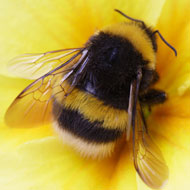Analysis confirms neonicotinoids risk to bees

The assessments looked at the impacts of neonicotinoids on wild bees, bumblebees and honeybees.
Most uses of neonicotinoid pesticides pose a serious threat to wild honeybees and bees, according to assessments published by the European Food Safety Authority (EFSA).
The assessments have led the Authority to update its risk assessment of three neonicotinoids - clothianidin, imidacloprid and thiamethoxam - which are currently banned in the EU because of the threat they pose to bees.
“There is variability in the conclusions, due to factors such as the bee species, the intended use of the pesticide and the route of exposure,” said Jose Tarazone, head of EFSA’s Pesticides Unit which carried out the assessment. “Some low risks have been identified, but overall the risk to the three types of bees we have assessed is confirmed.”
In 2013, the EU implemented a ban on the use of neonicotinoids after an assessment concluded that the pesticides posed a “high acute risk” to pollinators. For the new assessment, EFSA’s Pesticides Unit carried out extensive data collection exercise, including a systematic literature review to collate all of the scientific evidence published since the previous evaluation.
The team assessed the exposure of bees to neonicotinoid pesticides via three routes: residues in bee pollen and nectar; dust drift during the sowing/application of the treated seeds; and water consumption.
EFSA will now share its conclusions with risk managers from the European Commission and Member States, who will consider potential amendments to the current restrictions on the use of there pesticides.



 HMRC has invited feedback to its communications regarding the employment status of locum vets and vet nurses.
HMRC has invited feedback to its communications regarding the employment status of locum vets and vet nurses.